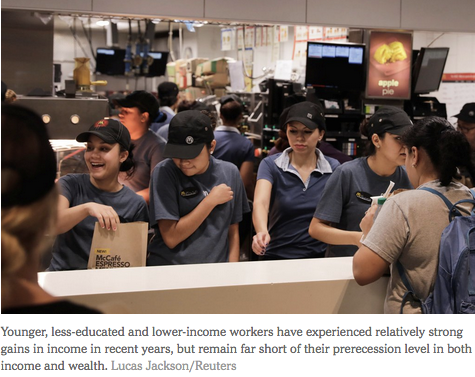Eight years after the Great Recession officially ended, the fruits of economic growth are finally spreading to low-wage workers, racial and ethnic minorities and other groups that were largely left out of the early stages of the recovery.
But in a pattern that has become familiar in recent decades, the biggest gains continued to flow to the richest Americans.
The typical American family had a net worth of $97,300 in 2016, up 16 percent from 2013 after adjusting for inflation, according to data released by the Federal Reserve Board on Wednesday. The gains were broad-based, cutting across racial, educational and economic categories — a significant shift from the years immediately after the recession, when both income and wealth continued to decline for many families.
But despite the gains, wealth also become more concentrated:
• The richest 1 percent of households controlled 38.6 percent of total wealth in 2016, up from 36.3 percent in 2013.
• The bottom 90 percent of households controlled 22.8 percent of all wealth.
Inequality could grow even starker under the tax plan unveiled Wednesday by President Trump and congressional Republicans. That plan would sharply reduce taxes on corporations and certain forms of business income, as well as eliminate the estate tax, which falls on only the wealthiest households. Mr. Trump has said his plan would not reduce taxes on the rich over all, but most independent experts are skeptical of that claim.




